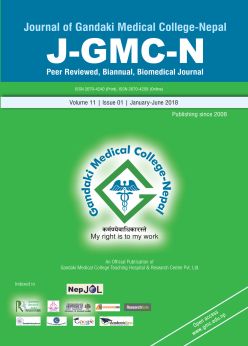Knowledge, Attitude and Practice towards Exclusive Breastfeeding among Mothers in Pokhara-Lekhnath
DOI:
https://doi.org/10.3126/jgmcn.v11i1.20793Keywords:
Attitude, Exclusive breast feeding, Knowledge, Practice, Reproductive age group motherAbstract
Background: Exclusive breastfeeding means that the infant receives only breast milk. Infants should be exclusively breastfed for the first six months of life to achieve optimal growth, development and health. Thereafter, to meet their evolving nutritional requirements, infants should receive nutritionally adequate and safe complementary foods, while continuing to breastfeed for up to two years or beyond. Breastfeeding is an unequalled way of providing ideal food for the healthy growth and development of infants; it is also an integral part of the reproductive process with important implications for the health of mothers.
Objective: To assess the knowledge, attitude and practice of pregnant women on exclusive breastfeeding.
Methods: The quantitative descriptive research design was used for this study. Purposive sampling technique was used to select the subjects in community setting. Total 140 subjects were taken as a sample and self-administered structured questionnaire on knowledge, attitude and practice of exclusive breast feeding among reproductive age group women was used to collect data.
Results: The study shows that out of 140 women, 48 (34.3%) belonged to 26 - 30 age group, 136 (97.14%) were married, 109 (77.9%) women followed Hindu caste, 67 (47.9%) women belonged to Dalit group, 129 (92.1%) women were housewife, 73 (52.1%) women had taken primary education, 68 (48.6%) had monthly income >20000, 116 (82.9 %) had ≤3 children. Among 140 women, 69 (49.3%) had good knowledge and fair knowledge whereas only 2 (1.4%) had poor knowledge. Regarding attitude 122 (87.1%) thought that EBF was better than other artificial feeding, 75 (53.6%) believed that first milk should be discarded, 108 (77.1%) agreed that EBF is enough for child up to 6 months, 77 (55%) didn’t feel comfortable with extra feeding other than breast milk, 51 (36.4) stated that they were not comfortable because of insufficient amount to meet child’s demand, 100 (71.4%) agreed that child less than six months who is exclusively breastfed were healthier than child who took additional foods. Out of 140 women, 139 (99.3%) breastfed her last child, 83 (59.3%) started breastfeeding within 1 hr after delivery, 77 (55%) breastfed on demand of baby, 91 (65%) had not given anything before initiating breastfeeding, 25 (17.9%) had given plain water before breast milk after delivery, 107 (76.4%) had given breast milk only starting from birth to six months of age.
J-GMC-N | Volume 11 | Issue 01 | January-June 2018, Page: 40-45
Downloads
Downloads
Published
How to Cite
Issue
Section
License
This license allows reusers to distribute, remix, adapt, and build upon the material in any medium or format for noncommercial purposes only, and only so long as attribution is given to the creator.

